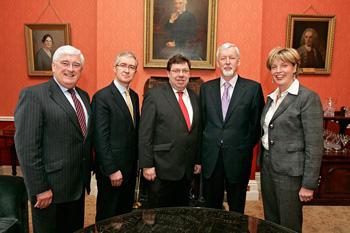Innovation Task Force report offers little new

The Innovation Task Force report is hugely flawed, but there is something there to work with. By Stephen Kinsella.
I'm interested in Irish public policy, especially its effect on Ireland’s long term challenges. So the Innovation Task Force report, which comes as an instantiation of the government’s Smart Economy strategy document. I scanned the document five minutes after it came out, and overall wasn't impressed with it, because, like the Smart Economy document, I felt it didn't really represent new thinking, or a concrete change of direction, but more of a wishlist plus solidification of the status quo. I said as much on the Last Word last Thursday night.
But today it's time to look again.
As usual in Ireland, you have to look a little more closely at these reports for two key factors: changes of tone within the document, and evidence of a cheque-book. Without these, any section in any government report is merely a subsidy to the printers of the report for printing extra blank pages. There may also be multiplier effects in stimulating Coilte employment.
Onto the report itself, the first thing to take issue with is its definition of innovation.
Innovation, apparently, is: "[I]nvestment aimed at producing new knowledge and using it in various applications. Increasing productivity is the key driver of economic performance and sustainability. Innovation, in both the production and use of ideas, technology and processes, is important in this context because it drives productivity. Ireland’s future economic success depends on increasing levels of innovation across all aspects of Irish enterprise."
Students of economics should note first that this definition comes straight from a simple production function-type definition of labour and capital-augmenting technology of the form:
Y = AF(K, L)
where Y is national output, K is capital (don't get into what that means right now, go here if you want to know more), and L is labour. That A is some measure of technology, and when it goes up, the efficiency of both K and L go up, and so does national output, Y. All of which should have students in my class hearing Keynes’ quote about "madmen in authority" loud and clear in their ears right about now.
The problem is that this kind of thing isn’t really what people like Joseph Schumpeter had in mind when they were talking about innovation. Schumpeter thought innovation was a destructive force, in that it replaced older forms of production with new ones in a messy and costly transformation. Go into PC World and ask for a typewriter ribbon, and you'll get the idea.
For people like Schumpeter, the innovating entrepreneur could in some cases be bad for the economy in the short run, by forcing inventories to increase and costly retooling to take place. Real innovation is transformational, in that it does lead to growth, but not through a reproduction of the system today but through its co-optation and destruction.
But enough of that. Let's take their definition of innovation, flawed as it is, as given, and assess the report on its own merits.
For me, the report and its recommendations can be broken down into five distinct areas:
1. Pure waffle
Anything proposing to establish a committee/review/scheme. Look at recommendations 10.1, 8.2, or the best, 6.3: "Introduce a scheme to ensure greater access by industry to HEI specialist equipment and laboratories." Add to that recommendation 9.8, which recommends the launch of a marketing campaign to promote Ireland to export-oriented entrepreneurs.
2. Processes already in place
For example, the big one; recommendation 5.1 which asks to keep the money flowing.
3. Tweaks to existing policies
Examples are recommendation 5.3 (increasing points for maths courses, rollout of project maths) and recommendation 8.9 (fiddle with research and development tax credit).
4. 'Brand new' thinking
Including recommendation 6.4 (establishing a national IP protocol), recommendation 8.3 (build an EU accelerator programme), recommendation 8.8 (make IP tax-efficient), recommendation 9.2 (new seed capital scheme) and recommendation 12.1 (establishing an innovation services centre).
5. Wishful thinking
For example, recommendations 10.7 or 8.1 (better procurement models) or the best, recommendation 7.1, which recommends "attracting top-tier venture partners from abroad".
But for me the biggest and most interesting aspect of the report is its recognition that to succeed, entrepreneurs need to be allowed to fail, and fail quickly. 10.7 is common sense, but perhaps it will be listened to when couched in these terms:
"10.7 Ireland's bankruptcy legislation should be modernised following the conclusion of the Law Reform Commission’s current consultation process on Personal Debt Management and Debt Enforcement."
Significantly, on page 98, the task force decides that this recommendation will be cost neutral.
Another problem I have with the report is its treatment of education, as apparently everything is fine there. I don't agree.
So overall the report is still a dud, but there is enough there to work with, and a growing consensus on what is important to do next. Sadly, even the importance of broadband gets long-fingered.
Reactions from elsewhere
Brendan Hughes notes this report is the sixth in a row to call for broadband provision. Nothing to argue with there, and, as my colleague Donal Palcic has pointed out again and again, every single agency who looks at this recommends the same thing. More broadband is a no brainer.
Frank Gannon, who was on the committee that wrote the report, doesn't see a contradiction in aspiring to create thousands of new startups while concentrating funding on core activities like biotech. Either you allow the thousand flowers to bloom, or you centralise the budget and concentrate. You can't do both with limited resources.
Constantin Gurdgiev isn't too impressed by the report. Essentially he feels it is just more of the same, and says so.
John McHale over on Ubereconomy is pretty positive on the report, relating it to existing literatures in economics and, essentially, pleads with cynical econonerds to stick with it.
